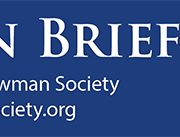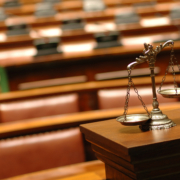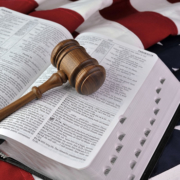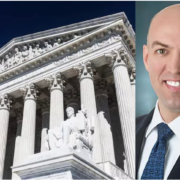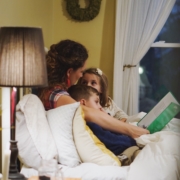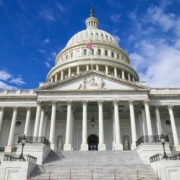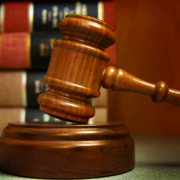A leading attorney for the defense of religious freedom says Catholic educators can learn an important lesson from the Supreme Court’s recent Fulton ruling, which allowed Catholic Social Services of the Archdiocese of Philadelphia to uphold its faithfully Catholic practices. The lesson: Have courage and stand firm in the Faith.
Like Catholic social and medical services, Catholic education faces growing threats from the Biden administration and many states and localities because of Catholic beliefs about the sanctity of life, the human person and marriage. While educators may be tempted to compromise on programs like women’s athletics or on policies like moral standards for teachers, doing so violates the very mission of Catholic education, and there is no escaping confrontation with gender ideology. The best legal protection is to be consistently and firmly committed to the Catholic faith.
“As Fulton shows, religious freedom is stronger when Catholic apostolates are standing in a long historical tradition and have the courage of their convictions,” says Eric Kniffin, legal adviser to The Cardinal Newman Society and attorney with Lewis Roca Rothgerber Christie LLP. He also worked previously for the Becket Fund and the Civil Rights Division of the U.S. Department of Justice.
“On the contrary,” he warns, “if Catholic schools disregard their calling and lose their saltiness, they will have a much harder time convincing students, parents and judges that they need religious accommodations.”
The Court’s June 17 ruling in Fulton v. City of Philadelphia protects the right of Catholic Social Services to continue receiving City of Philadelphia funding, without yielding to the City’s demand that it place children for foster care with same-sex couples. The Court’s deference to Catholic Social Services’ mission and beliefs, says Kniffin, is heartening given the Biden administration’s efforts to impose broad accommodations for homosexuality and transgender behavior in schools and colleges by twisting the nondiscrimination provisions of the federal Title IX education law.
Last Wednesday, the Biden administration released a “Dear Educator” letter insisting that “Title IX’s protection against sex discrimination encompasses discrimination based on sexual orientation and gender identity,” despite the fact that Congress never intended the law to have such a meaning. On Monday, the Court declined to consider a Virginia school board’s appeal to preserve the privacy of boys’ and girls’ bathrooms, leaving educators vulnerable to the Administration’s gender ideology.
The Education Department’s letter last week indicated that it expects schools and colleges to allow students to choose athletic teams based on their stated “gender identity” and give them access to the bathrooms and locker rooms of their choice. Moreover, the Department indicated that it would mandate what educators can believe and teach about sex, warning against a scenario in which “the teacher tells the class that there are only boys and girls and anyone who thinks otherwise has something wrong with them.”
Good for education
But the Fulton decision offers some hope of protection for religious education, to the extent that the Supreme Court respected Catholics’ right to uphold fundamental truths about human nature and sexuality.
“One of the most important victories for the Catholic Church in Fulton is that the Supreme Court voted unanimously in favor of a religious entity that believes that ‘marriage is a sacred bond between a man and a woman,’” Kniffin says. “Some on the left have argued that such a statement is akin to racial bigotry. The Court’s unanimous decision is a strong repudiation of that analogy.”
Instead, the Court remained consistent with its Obergefell ruling in 2015, which said, “Many who deem same-sex marriage to be wrong reach that conclusion based on decent and honorable religious or philosophical premises, and neither they nor their beliefs are disparaged here.”
In his majority opinion in Fulton, Chief Justice John Roberts took notice of the Catholic Church’s long history of serving children as an extension of its religious exercise, not apart from it. Catholic education is no different. This was a point that Kniffin made in the amicus brief he authored last year for the U.S. Conference of Catholic Bishops (USCCB) and the Pennsylvania Catholic Conference.
“This history was important in the Fulton case, because the City and its allies claimed that foster care has now become a ‘public service,’ which means that the contracts at issue here had no more religious significance than contracts for ‘road maintenance,’” Kniffin explains. His brief for the USCCB noted that the Court had already rejected this line of argument with respect to Catholic education in the 2012 Hosanna-Tabor ruling, which affirmed the ministerial exception for certain Catholic school teachers. In that case, the federal Equal Employment Opportunity Commission made the outrageous argument that the First Amendment does not apply to Catholic schools providing a “socially beneficial service … in compliance with State compulsory education laws.”
Just as Hosanna-Tabor helped the Archdiocese of Philadelphia make its case, the Fulton ruling gives Catholic education an even stronger argument for religious freedom, Kniffin says. “While caring for orphans falls under the corporal works of mercy, the work of Catholic schools falls under the spiritual works of mercy. When carried out as the Catholic Church intends … Catholic schools are carrying out a core religious exercise.”
On the other hand, the Fulton ruling is also a reminder of how fragile such rights can be in today’s secular society. Although the Supreme Court had the opportunity with this case to overturn its 1990 ruling in Employment Services v. Smith, it avoided the issue, thereby allowing states and cities like Philadelphia to attempt further discrimination against Catholic organizations as long as their laws and rules are generally applicable without exceptions. Catholic Social Services may soon have to return to court to protect its foster care services and force a review of Smith— or that review might occur because of a case involving Catholic education, which faces challenges with licensing, school choice funding, accreditation, participation in athletic conferences and other state and local attempts to impose gender ideology despite Catholic beliefs.
“The good news is that five justices in Fulton said that they believe that the Free Exercise Clause protects more religious liberty than the Smith decision might indicate,” Kniffin says. “Hopefully, this consensus will help dissuade government from even stronger efforts to force Catholic schools to abandon their convictions on matters of sexual morality and the human person. But if they do, the Court seems poised to protect the First Amendment right to free exercise.”
As for federal programs like college student loans and aid for textbooks and busing, Catholic education is protected by the religious exemption in Title IX — except that the Biden administration wants to maneuver around that exemption with the harmful Equality Act. Activists are also attempting to dismantle the Title IX exemption in court. To counter their arguments, the Cardinal Newman Society recently joined an amicus brief with the Christian Legal Society, several groups representing various religious beliefs, and Catholic schools and colleges that are recognized by the Newman Society for their faithful education.
By standing firm and refusing to yield our religious freedom, Catholic educators can hopefully continue to win in court. Moreover, the formation that Catholic education provides young people — if it remains consistently faithful to the teachings of the Church — can eventually renew society and restore respect for truth.
This article first appeared at the National Catholic Register.

